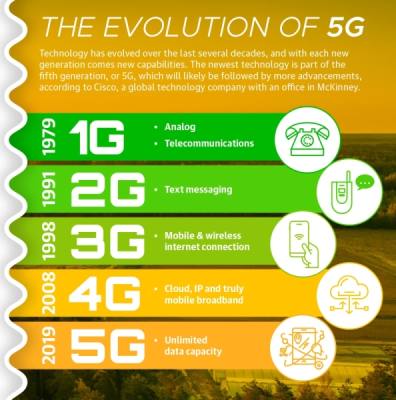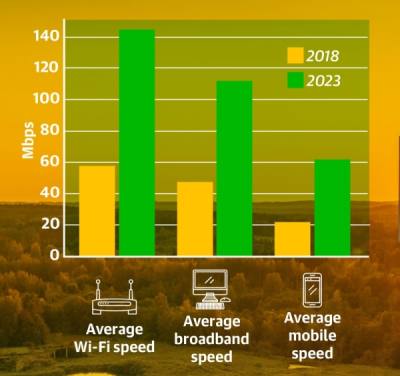Fifth generation, or 5G, technology is the newest and fastest wireless communication technology, according to service providers. It will eventually lead to the creation of new industries, including autonomous vehicles; smart communities; higher data transfer rates and new industrial advancements, according to city officials. Its availability will also make the city more attractive to new businesses and ultimately create more jobs.
But McKinney, along with other municipalities, has limited control over where and when 5G is implemented. Concerns about potential health risks have also been raised.
That is why McKinney is going through a strategic planning process that looks at its current ordinances in an effort to understand what exactly it can control, city officials said.
“Right now, companies have the ability to come into our right of way, and if we do not put ordinances in place that have governance, then we have no control over what is happening,” McKinney Mayor George Fuller said at a Feb. 12 town hall meeting.
The limits of regulation
Texas Senate Bill 1004, which became law in 2017, limited local governments’ ability to regulate where infrastructure for 5G technology is placed. It allows service providers access to public rights of way, which generally include public streets and underground utility lines.
5G relies on certain equipment to operate, including underground fiber-optic cables and a system of nodes carrying the 5G software. Those nodes are attached to poles or buildings to create a network. These networks essentially transmit bands of electromagnetic frequencies, allowing data to travel between capable devises.
The bill also capped the fees that cities can charge for each node in the public right of way at $250.
“The city of McKinney was against SB 1004 because we felt that it infringed upon the citizens’ rights to give away ... right of way for free,” McKinney Strategic Planning Manager Trevor Minyard said. “So the fee that we can now charge is considerably less than what we see the value of our right of way is.”
Following the bill’s passing, cities were required to create rules that providers must meet for their infrastructure.
McKinney did not issue any permits for wireless technology infrastructure between 2017 and 2019, Minyard said.
“There were no permits issued because we had a lengthy, thorough application process where we tried to do our due diligence to control what we could control,” he said.
But as the technology has become more advanced, city officials said they decided to look further ahead.
During a McKinney City Council meeting last February, city staff was instructed to develop a strategic plan for wireless technology implementation.
Council later adopted a series of guiding principles to give staff direction in their research. After hearing from multiple residents who were opposed to the new technology, citing concerns about public health and safety, an eighth principle was added.
The new principle directs staff to “ensure the health and safety of the residents, guests and visitors of the city of McKinney, [including] studies of the effects on health in areas serviced by 5G communications and the radiation emitted from signals transmitted,” according to a May 21 council resolution.
The city hired a consultant from engineering firm HR Green in October. Council approved roughly $64,870 for the firm’s help in developing policies to manage wireless and 5G rollout.
In addition to evaluating health concerns, HR Green’s scope of work includes reviewing and revising the city’s 5G Policy & Design Standards, conducting a cost recovery study and developing right of way policies. It will also create a map of key routes for fiber cables as well as design guidelines and construction specifications.
At the end of 2019, the Federal Communications Commission put more limits on how cities could manage 5G technology, according to Jennifer Sanders, cofounder of North Texas Innovation Alliance. This included expedited timelines to evaluate permit applications and set fees that cities could charge for access to light and electric poles, she said.
“While this limits some of the cities’ control over the rollout, it also streamlines processes, which can help internal efficiencies,” Sanders said in an email.
Gathering information first
Based on HR Green’s scope of work, city staff decided to take a phased approach. Phase 1, which has already begun, is the “information-gathering stage,” Minyard said.
“That is analysis; that is infrastructure assessment; that is right of away congestion assessment; that is understanding what is actually in the ground and what actually exists today in our right of way,” Minyard said. “[We will study] if there are health impacts in response to these types of technologies, what those may be and some type of greater analysis into what we’re dealing with.”
In addition, the city will host town halls during this phase to gather community feedback, Minyard said. Its first one was Feb. 12. No other dates have been set.
City staff plans to bring their findings to council in April or May and receive direction on whether to continue to Phase 2, Minyard said. That phase will involve the deployment of infrastructure or bids for specific types of businesses.
Concerns about 5G
The four largest wireless service carriers—AT&T, T-Mobile, Verizon and Sprint—all carry versions of 5G now. And as 5G rolls out across the U.S., North Texas is increasingly becoming more attractive, according to Sanders.
“North Texas is definitely a top market for 5G, and providers are moving quickly, but it will still take some time for a full-coverage 5G environment to be in place,” she said in the email.
Across the country, some cities and organizations are fighting to keep 5G out of their communities. Some McKinney residents have expressed concerns that the exposure to higher frequencies of radiation could potentially lead to more cases of cancer, infertility or other health issues.
“We are more than people just complaining that there is a possible greater harm in implementing 5G,” McKinney resident Tasha Escoto said in an email.
Escoto said she started a Facebook page that cites experts who have found that current technology is harming people’s health.
The FCC stated last fall that there are no health concerns and that cities must continue following its standards, HR Green Project Manager Ken Demlow said.
“It is challenging because the FCC has taken their stand,” Demlow said. “And so now, it’s kind of navigating what’s best for McKinney.”
The city is now trying to figure out what it can do, Demlow said.
“We take the health concerns extremely, extremely seriously, and we’re expecting a robust response to our concerns and [residents’] concerns when HR Green comes back to the council,” McKinney City Council Member Scott Elliott said. “We have a lot of questions to answer before we start any sort of a 5G plan.”








